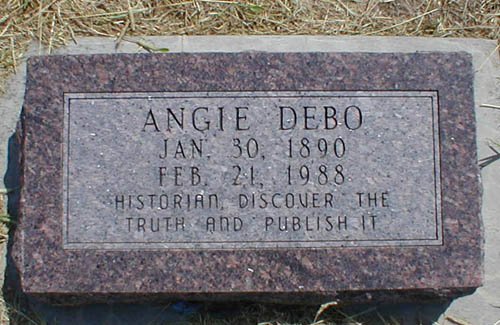Oklahoma Cemeteries Website
Click
here
to break out of frames
This information is available for free.
If you paid money for a
subscription to get to this site, demand a refund.
For any questions pertaining to an individual cemetery, you would need to contact the cemetery sexton / board / caretaker.
 © Bob Chada
© Bob Chada
| Angie DEBO |
Angie Debo Biography from Center for Great Plains Studies |
| Submitted by: Jo Aguirre |
Angie Debo was born on January 30, 1890, less than one year after the Indian lands in Oklahoma Territory were opened for settlement. The Debo family did not participate in the Oklahoma land rush of 1889, but arrived ten years later when Debo was nine. She traveled to Marshall, Oklahoma Territory, in a covered wagon with her mother and younger brother, while her father rode ahead with the farm machinery. Debo wrote in her diary that she was hoping to see Indians as she reached Oklahoma, but instead only saw white settlers.
Debo attended a rural grade school and was taught very little Indian history. Since there was no high school in Marshall until 1910, Debo obtained her teacher's certificate at age sixteen and taught in rural schools near the family farm. She describes this time as miserable, because she wanted to accomplish something with her life. She finally graduated from high school at the age of twenty-three, one of nine members of Marshall's first graduating class.
Debo graduated with a bachelor's degree in history from the University of Oklahoma in 1918. She taught history for four years in the Enid High School, then enrolled in the University of Chicago to work on a master's degree. Because women were not allowed to enter the history field at this time, Debo studied International Relations. In 1924, Debo not only received her master's degree, but also published her thesis, "The Historical Background of the American Policy of Isolation," co-authored with J. Fred Rippy, in the Smith College Studies in History.
From 1924 to 1933,Miss Debo was on the faculty of the history department in West Texas State Teachers College and served as curator of the Panhandle-Plains Historical Museum. During this time, she worked on her doctorate at the University of Oklahoma. In 1933 Debo received her Ph.D. and by the next year her dissertation was published by the University of Oklahoma Press in a book, The Rise and Fall of the Choctaw Republic. The book was awarded the John H. Dunning Prize by the American Historical Association, which encouraged her to pursue research and freelance writing. She returned to Marshall and signed a book contract with the University of Oklahoma Press to pursue a new field of study, the history of the American Indian. Debo felt that a full history of America could not be given without information about American Indians
In 1936 Debo wrote, And Still the Waters Run, a book about the theft from Indians of their lands in Indian Territory. Because the manuscript gave an unappealing view of the history of Oklahoma, at least unappealing to state government officials, and named prominent citizens and government leaders in the theft, the University of Oklahoma Press backed out of its contract and refused to publish the book. Around this time, Debo accepted a job with the Federal Writers Project to edit their guide on Oklahoma. She was assigned and wrote the chapter on the state's history. She wrote it, but much to her horror, a different chapter was substituted for hers by an unknown author. It was published under Debo's name and contained errors in favor of the settlers.
Debo was a leading scholar of Indian history, and her work has been cited as evidence in federal court cases involving tribal land rights. However, the state of Oklahoma did not recognize Debo's lifelong achievements until the 1980s when she was in her 90s. Her portrait was hung in the state capital next to humorist Will Rogers, Indian athlete Jim Thorpe, and many of the state's leaders she had exposed in her books. In 1993 Debo was inaugurated to the Oklahoma Historians Hall of Fame. She stated that she had one quality that got her through her long life and that quality was drive. Debo died February 21, 1988.
From 1924 to 1933, Debo was on the faculty of the history department in West Texas State Teachers College and served as curator of the Panhandle-Plains Historical Museum. During this time, she worked on her doctorate at the University of Oklahoma. In 1933 Debo received her Ph.D. and by the next year her dissertation was published by the University of Oklahoma Press in a book, The Rise and Fall of the Choctaw Republic. The book was awarded the John H. Dunning Prize by the American Historical Association, which encouraged her to pursue research and freelance writing. She returned to Marshall and signed a book contract with the University of Oklahoma Press to pursue a new field of study, the history of the American Indian. Debo felt that a full history of America could not be given without information about American Indians
In 1936 Debo wrote, And Still the Waters Run, a book about the theft from Indians of their lands in Indian Territory. Because the manuscript gave an unappealing view of the history of Oklahoma, at least unappealing to state government officials, and named prominent citizens and government leaders in the theft, the University of Oklahoma Press backed out of its contract and refused to publish the book. Around this time, Debo accepted a job with the Federal Writers Project to edit their guide on Oklahoma. She was assigned and wrote the chapter on the state's history. She wrote it, but much to her horror, a different chapter was substituted for hers by an unknown author. It was published under Debo's name and contained errors in favor of the settlers.
Debo was a leading scholar of Indian history, and her work has been cited as evidence in federal court cases involving tribal land rights. However, the state of Oklahoma did not recognize Debo's lifelong achievements until the 1980s when she was in her 90s. Her portrait was hung in the state capital next to humorist Will Rogers, Indian athlete Jim Thorpe, and many of the state's leaders she had exposed in her books. In 1993 Debo was inaugurated to the Oklahoma Historians Hall of Fame. She stated that she had one quality that got her through her long life and that quality was drive. Debo died February 21, 1988.
|North I O O F Cemetery Page| |Garfield County Cemetery Page| |Home|
This site may be freely linked, but not duplicated in any way without consent.
All rights reserved! Commercial use of material within this site is prohibited!
© 2000-2025 Oklahoma Cemeteries
The information on this site is provided free for the purpose of researching your genealogy. This material may be freely used by non-commercial entities, for your own research, as long as this message remains on all copied material. The information contained in this site may not be copied to any other site without written "snail-mail" permission. If you wish to have a copy of a donor's material, you must have their permission. All information found on these pages is under copyright of Oklahoma Cemeteries. This is to protect any and all information donated. The original submitter or source of the information will retain their copyright. Unless otherwise stated, any donated material is given to Oklahoma Cemeteries to make it available online. This material will always be available at no cost, it will always remain free to the researcher.






